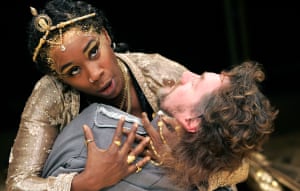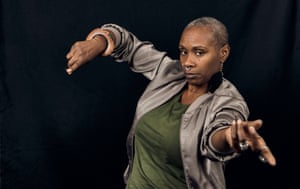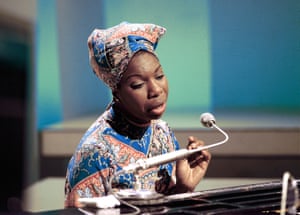Josette Bushell-Mingo: ‘Nina Simone is my GPS’ | Stage
Josette Bushell-Mingo remembers the first time she saw Nina Simone sing â€" long before she became an actor herself: “I was at my aunt’s house, watching television. I’d have been about 11, and while the others were in the kitchen, she suddenly came up â€" I think it must have been on video. She was black as the night, with short hair, and she was sweating â€" it was almost obscene. She was at the piano and so filled with power, I was mesmerised. I’d never seen anything like it. I asked my aunt: ‘Who was that?’ And she said: ‘Nina Simone.’â€
Among the things that Bushell-Mingo could not guess aged 11 (she grew up in southeast London, the daughter of Guyanese parents, a bus driver and a nurse), was that, more than 40 years on, she would be transfixing audiences with her own take on the legendary singer. Her show, Nina: A Story About Me and Nina Simone, started life at the Liverpool Unity theatre and is, if reviews are to be believed, an unforgettable rallying cry and, for white audiences, a thought-provokingly uncomfortable experience. It is about to open at the Young Vic and there is already talk of it being made into a movie.
I last met Bushell-Mingo in the early 2000s, when she was launching a black theatre festival at the Almeida theatre, London. She had worked for the RSC and the National and been nominated for an Olivier in 1999 for her baboon/witch doctor Rafiki in The Lion King. At 53, she has not changed at all â€" she is a charismatic dynamo with bags of charm â€" although it is Sweden (her husband is Swedish) that has been on the receiving end of her creativity in recent times. She is artistic director of Riksteatern, the national touring theatre of Sweden, and tells me Nina has been a hit in Stockholm although a “target for the rightwing movement. They’ve written to me with racist comments, saying: ‘You monkey, how dare you?’ and stuff like that. Which is quite normal for me,†she adds, laughing the sort of laugh that means: no joke.

We grab a quick lunch â€" there is never enough time for Bushell-Mingo (I remember that from last time). We are at Coventry University where she has, to her delighted disbelief, just been made a visiting professor. We have a freezing conference room to ourselves â€" the air-con has gone into overdrive â€" and she pulls a soft grey shawl around her shoulders, a garment in docile contrast to her fantastic militant jewellery (diamante nose ornament, a V for victory black power sign in rubber â€" size of a baby’s fist â€" the most dominant earring I have ever seen). Not that she needs accessories to compel. If anyone could play Nina Simone, this is the woman to do it.
Only that this turns out to be missing the point: “I don’t play Nina â€" only Nina could play herself. This show evokes her spirit â€" her danger, decadence and almost belligerent demand on audiences.†We talk about the footage of the 1976 Montreux jazz festival that inspired Bushell-Mingo, in which Simone comes on, makes a slow bow and stares inscrutably at her audience. What other artist ever gave audiences that unsafe feeling â€" the sense she might not perform at all?
I tell her I recall this belligerence and uncertainty â€" I saw Nina Simone at Ronnie Scott’s in the 1980s and remember her berating the audience. It was thrilling to see her perform but unnerving. She described her talent as a “gift and a burden†and you could feel the truth of both words. She once likened her voice to “gravel’ and, in its more mellow moments, to “coffee and creamâ€. Bushell-Mingo makes no attempt to imitate it, describing her own vocal range as “operaticâ€: “I sing 15 of Nina’s songs in an hour and 20 minutes. I go as high as you can go and as low.†The belligerence, she sees as an opportunity: “I’m not doing it to make people uncomfortable. Nina did it as revenge and artistic demand. I want to sound out what the audience is going through.â€
It is Nina Simone’s anger that moves Bushell-Mingo most â€" her work for the civil rights movement. Simone knew Martin Luther King, Malcom X, James Baldwin, Lorraine Hansbury and Stokely Carmichael. She described American society as a cancer she could not cure but aimed to expose. When Unity (the radical Liverpool-based theatre of which she is a patron) asked Bushell-Mingo to do a show, she knew Nina was the right choice because: “I had become angry again. I’ve never stopped being angry but the anger has turned to rage. I realised I couldn’t just sing her songs, I needed to talk about the political aspect of her work.â€
It was the summer of 2015: “I call it the summer of death because of the number of blacks killed during that time â€" and this continues. But what tipped me over was Sandra Bland [the 28-year-old black woman arrested for failing to signal when changing lanes and subjected to racial violence who later hanged herself in jail]. Sandra Bland broke my heart.â€
For Bushell-Mingo, Bland’s death and others like it raised “a deep question about what I am doing as an artistâ€. She sets this against the background of living in Sweden, where she fears that the nationalist Sweden Democrats, the country’s third biggest party, might win the next election. When members of the American civil rights movement told Simone they needed her voice, it gave her purpose: Bushell-Mingo feels the same way. Spurred on by this show, she tells me, from now on all her work will be political. In a time where “questions of race and identity†are crucial, “Nina Simone is my GPSâ€.

There were personal reasons for Nina Simone to be angry â€" the first was that her dream career was frustrated. Born Eunice Waymon, she trained as a concert pianist, crossing the railroad tracks in North Carolina to learn from a white piano teacher who had spotted her talent. Aged six, she gave a church concert recital at which her parents were told to move from the front to the back row. Starting as she meant to go on, Nina refused to play until the segregationist rule was suspended. She attended the Juilliard School in New York for a year and a half, but was then â€" after an outstanding audition â€" turned down by the Curtis Institute of Music in Philadelphia. No prizes for guessing why. To make ends meet, Simone played “cocktail piano†or what she called “the devil’s music†in a crummy Atlantic City nightclub, working in evening dress from midnight until seven in the morning. It was there she was told to sing, and it was the finding of her voice â€" never her idea â€" that would make her name.
The other reason for anger was a violent marriage. In the 2015 documentary What Happened, Miss Simone? Nina Simone’s daughter, Lisa, describes her mother as having had “a love affair with fireâ€. Her husband/manager, Andrew Stroud, an ex-New York vice squad cop, beat her up, put a gun to her head and raped her in the last stages of their marriage. She wrote: “He actually thinks I want to be hit (he told me so).†And later: “Andrew and I talked of my possible suicide. He let me know that he would not only not suffer, but he would be relieved. I hate him â€" I have every intention of leaving him, if I live.†Eventually, she did leave him and was, towards the end of her life, diagnosed as bipolar. Antidepressants helped her sing on against the grain.
To what extent was Simone’s championing of violence a way of voicing the rage she dare not express at home? “I’ve chosen not to focus on her being bipolar or the way she was fucked over by the music industry â€" and you can print that because she was.†Bushell-Mingo’s show is defiantly non-biographical because “what happens is that women get placed in a room where it is said, ‘She suffered so badly†â€" and something gets taken away from their musicianship. Nina took the terror of what was happening to her and charged her music with it. She used her singing as a release, a way to fight back â€" it was her resistance.†But she will admit that, for anyone who knows about Simone’s life, it is possible to detect that “music is a form of depression although this is very subtleâ€.

Learning the songs has been illuminating. Singing I Loves You, Porgy (Simone’s greatest hit), she was amazed by what Nina’s voice does â€" the inimitable mix of pain, yearning and joy. I say that whenever I listen to Nina Simone, I feel a sense that she owns the music, that it is essentially private property â€" she lets you into each song like a secret. The exceptions are her political songs such as Mississippi Goddam, a furious response to the death of four children in the bombing of a Sunday school in Birmingham, Alabama.
Bushell-Mingo describes herself as an “optimistic pessimistâ€, who believes she needs to face what frightens her: “I want to stay down in the valley, I want to because I’m afraid that, if I don’t, when the real shit hits the fan, I won’t be able to face it. I want to talk about the Nazis, I want to talk about women’s position, I want to talk about Islamophobia, I want to talk about these things. I want to provoke but not just for the sake of it.â€
What would she like to teach her two sons? “I’d like not to have to teach them anything. I don’t want to have to tell my child at the age of seven, ‘Don’t let anyone touch your hair’, or have to explain the N-word. OK, we can have better discussions now: ‘Your father is white, your mother is black, what does that mean?’ My children are so knowledgeable, it is wonderful. They are 15 and 13 and the coolest men. I laugh at them and say: ‘When you are older, I will sit and have a drink with you’, and they look at me in disgust.â€
Her boys have not seen the show and might well decide to pass rather than confront their mother in revolutionary mode. She describes the first night in Stockholm as “one of the most terrifying nights of my life because I was in front of my community. This is a show where I can feel the black people going: ‘This girl had better be effing good. If she shames us, I’m outta here.’â€
Simone asked herself what freedom is â€" and I ask Bushell-Mingo the same question: “This show is about freedom. Without Nina and so many before, I would not have the freedom to do it. People talk about white privilege all the time. Fuck that! I have got quite a lot of black privilege too.â€
Bushell-Mingo is, once again, about to prove herself keeper of Nina Simone’s flame and a firebrand. Is there any song she could not bear to be without? A brief hesitation: “Feeling Good. That song epitomises my power. Our power as blacks.†It is a wonderful but surprising choice because of its rare hope:
Stars when you shine,
you know how I feel.
Scent of the pine,
you know how I feel
Yeah, freedom is mine,
and I know how I feel...
It’s a new dawn, a new day,
it’s a new life for me.
She adds: “I’ve found a kind of church in it when I sing it. I find forgiveness in the song for myself and for things I’ve never been able to do. I’m getting quite emotional now... I find my way home through that song when I sing it, I claim something back.â€
Nina: A Story About Me and Nina Simone is at the Young Vic, London SE1, 19-29 July

0 Response to "Josette Bushell-Mingo: ‘Nina Simone is my GPS’ | Stage"
Posting Komentar